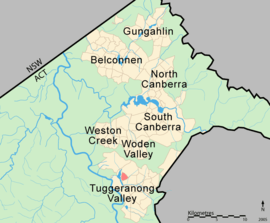Oxley, Australian Capital Territory
| Oxley Canberra, Australian Capital Territory | |||||||||||||
|---|---|---|---|---|---|---|---|---|---|---|---|---|---|
 | |||||||||||||
| Coordinates | 35°24′22″S 149°04′48″E / 35.406°S 149.080°ECoordinates: 35°24′22″S 149°04′48″E / 35.406°S 149.080°E | ||||||||||||
| Population | 1,786 (2011 census)[1] | ||||||||||||
| • Density | 1,654/km2 (4,283/sq mi) | ||||||||||||
| Established | 1985 | ||||||||||||
| Gazetted | 22 March 1982 | ||||||||||||
| Postcode(s) | 2903 | ||||||||||||
| Area | 1.08 km2 (0.4 sq mi) | ||||||||||||
| District | Tuggeranong | ||||||||||||
| Territory electorate(s) | Brindabella | ||||||||||||
| Federal Division(s) | Canberra | ||||||||||||
| |||||||||||||
Oxley (postcode 2903) is the smallest suburb in Canberra. It is located in the district of Tuggeranong. The suburb is named after the explorer John Joseph William Molesworth Oxley (1783 to 1828), who explored parts of New South Wales.[2] It was gazetted on 22 March 1982[2] and first settled in 1985. Streets are named after social reformers[2] and the suburb has an area of 1.08 km².
It is next to the suburbs of Greenway, Wanniassa and Monash and is bounded by Drakeford Drive, Taverner Street and Erindale Drive.
Geology
Deakin Volcanics green grey, purple and cream rhyolite occurs over most of the suburb and Deakin Volcanics green grey and purple rhyodacite is found in the far south east corner. These rocks are from 414 mya in the Silurian period.[3]
Notes
- ↑ Australian Bureau of Statistics (31 October 2012). "Oxley (State Suburb)". 2011 Census QuickStats. Retrieved 15 February 2014.
- 1 2 3 Canberra's suburb and street names : origins and meanings. Department of the Environment, Land and Planning. 1992. p. 98. ISBN 1-86331-128-9.
- ↑ Henderson G A M and Matveev G, Geology of Canberra, Queanbeyan and Environs 1:50000 1980.
References
This article is issued from Wikipedia - version of the 8/20/2016. The text is available under the Creative Commons Attribution/Share Alike but additional terms may apply for the media files.